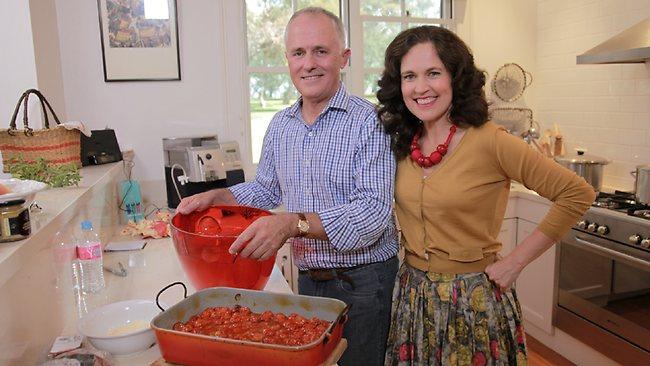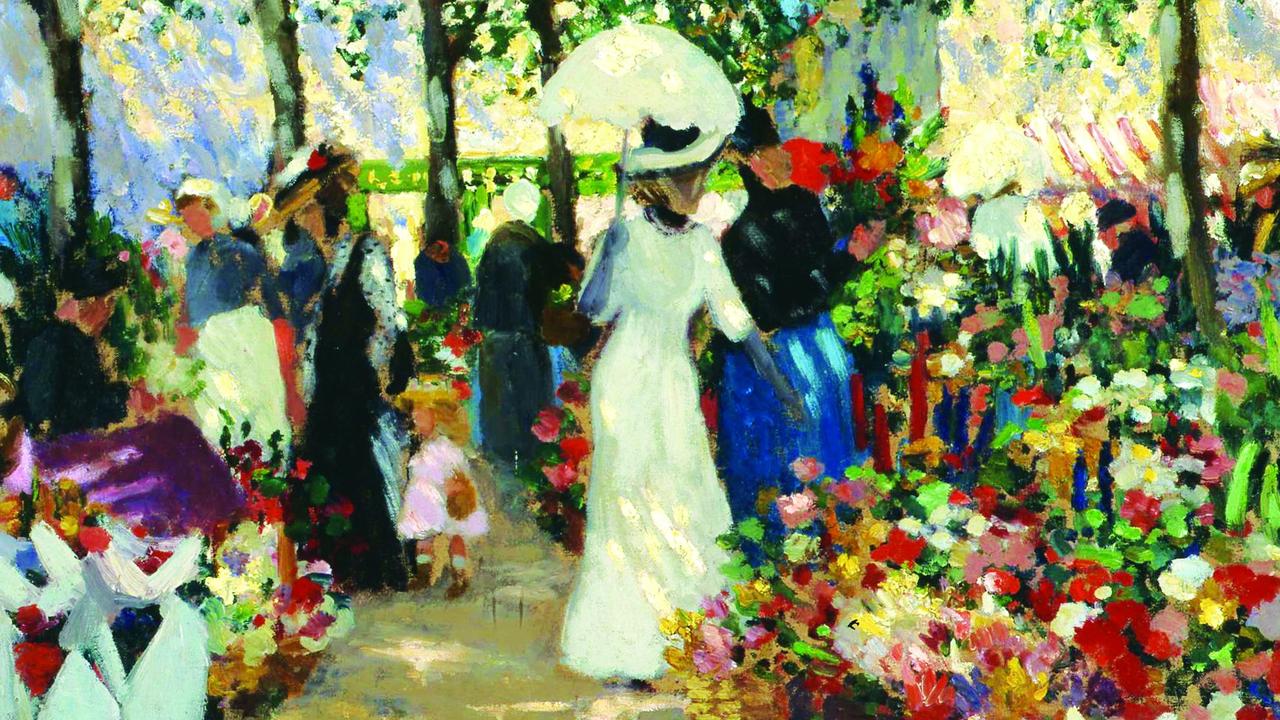Political fare: Annabel Crabb reopens her Kitchen Cabinet
ANNABEL Crabb lets us know what our national leaders are up to.

'A MAN may be a pessimistic determinist before lunch and an optimistic believer in the will's freedom after it," Aldous Huxley once wrote. It might be the tag line for Annabel Crabb's Kitchen Cabinet, which returns this week, and not to the nether regions of the digital channel but to prime-time ABC1.
It's the engaging and rather offbeat political interview series in which the reliably droll and slyly inquisitive ABC political commentator eats and talks food and recipes with her subjects while dipping into their biographies.
The idea is based on the accepted wisdom that dinner bookings with politicians can turn into anthropological studies. (Tony Blair wrote in his memoir A Journey that the relationship between alcohol and prime ministers, for instance, could fill a book, not that Crabb encourages overindulgence in her subjects.)
After all, when people tell you how they learned to cook, or didn't, they usually end up telling you their life story. Crabb wants her subjects to drop their guard and their slogans and spin as they're forced to prepare a meal and share it with her. It doesn't always happen, but most have tried valiantly at least to appear human, to behave naturally rather than performing a political function according to a predetermined set of coded instructions.
And some have surprised, such as Joe Hockey, who turned out to be great talent, as TV reality people say, gregarious and blokishly charming. And Greens leader Christine Milne shared her home-baked onion and goat's cheese tart with Crabb in one compelling episode, her domestic geniality contrasting with her political steeliness.
She was a charmer. And there are a few in this new series too, including senator Nick Xenophon cooking barbecued octopus in Adelaide, Craig Emerson smoking out his Queensland kitchen with a spicy salmon stir fry, and Liberal MP Sussan Ley, who flies her own plane to the location and cooks a country roast.
Crabb was slightly awkward at first, as you may expect of someone who, while she had made countless TV appearances as herself, had never really had to act herself before. In her TV interviews and current affairs appearances on the ABC's The Drum and Insiders, she just turned up and chatted on, always amusing, perceptive and sometimes dryly acerbic.
But in the TV series she is a character in a show and the demands are different. As anyone who has appeared on TV for any length of time knows, it's hard to know how to play being yourself. Bert Newton fretted about it for years and his friend Graham Kennedy never understood it either.
"In order to be a personality of TV," he used to say, "you first have to prove you haven't got one."
The great US interviewer Dick Cavett said a worried Johnny Carson once admitted to him that he frequently couldn't remember what was said on a show he had just finished taping - and, sometimes, who the guests were. "Johnny all but wiped his brow when I told him it happened to me too, and that a few days earlier I got home and it took me a good 10 minutes to be able to report with whom I had just done 90 minutes," he said, recalling later that it was no less a figure than Lucille Ball.
"It's an oddity peculiar to the live performer's divided brain that needs exploring," Cavett said. "It has to do with the fact that you and the 'you' that performs are not identical."
Well, Crabb has figured it out now. She's altogether more svelte, accomplished and less hesitant, and even more entertaining. And she understands how to position herself unobtrusively for the cameras. She's also mastered the two other things TV presenters need. The first is being able to turn conversation into humour. And the other is the oldest skill in TV: making the viewers believe they are on an intimate footing with everything and everybody.
She has grown into her costume too, the way experienced actors do. She wears multi-coloured vintage-inspired 1950s dresses and her hair is usually styled in a variation of the victory roll, apparently named after the manoeuvres performed by victorious Allied airmen at the end of World War II. She wears it with a hint of the elegantly dishevelled.
Her skin glows and she appears so wholesome you can't help but be reminded of the luminous Donna Reed who, as the star of her own sitcom between 1958 and 1966, epitomised selfless American motherhood, though her crowning achievement had been winning an Academy Award for playing a prostitute.
Crabb's eyes sparkle with what seems like seemingly careless innocence and a genuine liking for her subjects, but lurking beneath is the shrewd acumen so apparent in her columns. She eschews the combative for the sneaky and, sometimes - well, often - the flirtatious, always trying to tease out some anecdote or detail of the most personal stories. And she gets them too from Malcolm Turnbull in the first episode of the third season this week. The former Liberal leader is no stranger to Crabb; she profiled him for her 2009 Walkley Award-winning Quarterly Essay, Stop at Nothing: The Life and Adventures of Malcolm Turnbull. First, though, she ritually prepares dessert (she does one in her retro-style kitchen in a stylised montage at the start of every show). This time it's a confection of chocolate mousse, raspberry streaked cream and honeycomb. "It's much like my host," she says, "multi-layered, intriguing and just as rich as you think it is."
Then Crabb interviews Turnbull at his property in country NSW, bought by his father in 1981. They catch yabbies for lunch in the dam, inserting some good jokes about cornered opposition members and bloodless coups in the conversational mix. A dab hand in the kitchen (Turnbull's wife, Lucy, who joins them for lunch, says "it's a well-travelled place for him"), the chatty pollie prepares roast tomato, yabbie and rocket pasta.
And he talks generously about the personal toll fierce leadership battles take and the bleak period that followed his removal as leader. "If you are completely and utterly lacking in a sense of self-awareness, and you are absolutely oblivious to what everyone else thinks, you are perfectly suited to being a political leader," he says dryly.
"On the other hand if you are dripping with empathy and you take seriously what other people think, then you run the risk of being seriously hurt." Then, after a pause, he asks rhetorically: "How can you be an effective political leader and be a human being?"
I was reminded of something Gore Vidal wrote: "Style is knowing who you are, what you want to say, and not giving a damn."
THE seemingly indefatigable media presence known as Joe Hildebrand also returns this week with Shitsville Express, and he has no problems about presenting himself on TV. He arrived on ABC1 last year in Dumb, Drunk & Racist, a cunning of mix of fly-on-the-wall documentary, travel program and tabloid current affairs show dealing with the politics of national identity held together by Hildebrand's gonzo observations.
An astute columnist and working journo, he takes the mickey out of people and ideas, calling it as he sees it. He's populist and contrarian, sometimes rightist and leftist at the same time, and often vastly entertaining. In his previous show Hildebrand took four Indians on a road trip for three weeks to examine our worst racial stereotypes and to discover whether it's more a case of cultural misunderstanding and that we are really lovable larrikins who just like swearing a lot.
Produced by the Cordell Jigsaw group, which also gave us the award-winning Go Back to Where You Came From, it was conceptually like the inverse of that series, another version of a kind of through-the-mirror TV. The show's producer Anita Jorgensen called it a "let's-just-drive-and see-what-we-get" factual documentary. This new series, directed by Rick McPhee, a producer on Go Back to Where You Came From, uses a similar format and it's just as confronting and entertaining.
Hildebrand takes four so-called "leaders of tomorrow" on a shiny red double-decker bus ride to "Shitsville" to tackle some of our most fraught issues. They include the explosion of alcohol-fuelled violence, the gambling epidemic, our substandard transport system, the housing crisis and the pros and cons of coal-seam gas mining. Shitsville, the show tells us, isn't a particular destination - it's that part of Australia that sums up the mediocre side of our national life.
Siobhan, a 21-year-old social sciences student, supports the Australian Sex Party and the Australian Taxpayers Alliance. Francis, a 22-year-old member of the Labor Party, supports gay marriage and disagrees with the party's refugee policy. Madeleine is a 24-year-old "blue-collar Greens" arts/law student at the University of Tasmania. And 26-year-old Sydneysider Jai works full time as national executive director of Australians for Constitutional Monarchy. As they say in reality TV, only three things count: casting, casting and casting.
Like its predecessor, this second season is no simple fly-on-the-wall, spy-cam observational piece of cheapie TV but turns the confessional-style, immersive reality series into a morally weighted piece of social history. There is an element of testimony and subjective personal involvement to it that separates the series from any scripted program that may examine the same ideas. Be warned, though; this week's episode, which deals with assault and the way binge drinking fills our casualty wards on weekends with drunk or injured teenagers, contains genuinely horrifying footage.
I said in reviewing Dumb, Drunk & Racist that the series should be the start of an entertaining run of argumentative shows, hopefully fronted by this disarming guy who shows that not all ABC types wear sandals, drink green tea and congest Sydney's cycle lanes, as is often claimed. It's pleasant to have been right for once.
WEDNESDAY Night Fever, ABC1's new late night, weekly comedy series, starts this week, apparently combining political impersonations, satirical characters, special guests and knockabout musical comedy - all in front of a studio audience. Our host is the comedian known as Sammy J, who has already earned a reputation as one of the most inventive performers on the international comedy scene.
His live shows, often with foul-mouthed, purple puppet Randy, include the smash-hit international comedy festival sensation Sammy J in the Forest of Dreams.
The regular cast includes Amanda Bishop (At Home with Julia), Paul McCarthy (Comedy Inc, At Home with Julia), Genevieve Morris (The Late Shift) and Dave Eastgate (Elegant Gentleman's Guide to Knife Fighting). Head writer is the veteran Ian Simmons (Good News Week, Glass House) and creator and producer is Rick Kalowski (At Home with Julia).
There are no preview discs but Kowalski promises an old-style sketch review hashing out the week's political and cultural events in a style somewhat reminiscent of the D-Generation, which aired on the ABC in 1986, and, more specifically, the same group's later effort The Late Show in 1992, which established Tony Martin, Santo Cilauro, Jane Kennedy, Mick Molloy and Rob Sitch as a significant comedy force.
"I, myself, look forward to knowing what it's like because we haven't shot the show yet," Kowalski says. "We're doing it almost live to air on the Tuesday night, more or less right through like a live show, and then we edit and legal it overnight, from 9.30pm until about six in the morning, before it screens on Wednesdays." He calls it "a glammed-up version of what The Late Show used to be". The difference is his show will be "100 per cent topical" and written from scratch every week. "Assuming that [the government] lasts the distance, we'll be on the air until mid-August, then Gruen and The Chaser take over up to the election; they'll be doing commentary but we'll be doing all the characters themselves, in the studio."
He lists Gillard, Tony and Margie Abbott, Bill Shorten, Julie Bishop, Joe Hockey and Barnaby Joyce for starters.
"I think we have a real handle now on the tone of the show but it's the technical difficulties that have to be really ironed out - exactly how many people can we have in a sketch, getting them in and out of costume in time to make later appearances and coping with the huge make-up jobs," he says. "It's all very theatrical working in front of that audience and if things go wrong you just keep going."
Kowalski seems determined to capture the surreal madness of live comedy and keep the unruly traditions of vaudeville and variety alive as a form of electronic circus.
As he spoke, I thought of the fact there is some historical evidence that tickling was used as a method of torture and execution in centuries past. In one reported technique, a victim was tied up and the soles of his feet were covered with salt. A goat was then brought in to lick the salt, causing intense tickling. If kept up for long enough, the stress and exertion of laughing - and squirming - could have brought on cardiac arrest or a brain haemorrhage. I hope Kowalski's show hurts to watch, otherwise he just may find himself the one tied to the stake and his feet salted.
Kitchen Cabinet, Tuesday, 8pm, ABC1.
Shitsville Express, Tuesday, 9.30pm, ABC2.
Wednesday Night Fever, premieres July 3, 9.30pm, ABC1.



